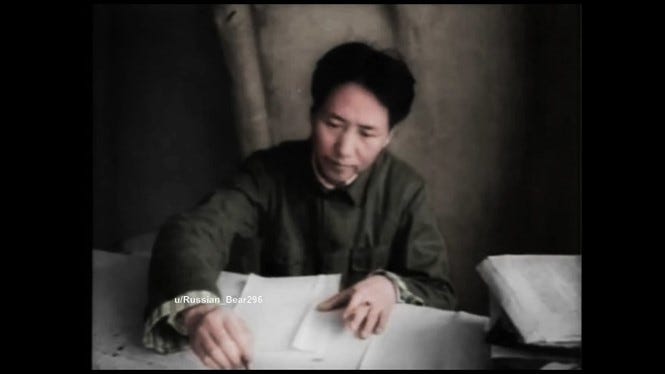War Between Chiang and Kwangsi Warlords
[a tsu, to the melody Tranquilized Notes, Ching-ping Yueh]
[Translated by Nancy Lin]
A sudden shift of Wind-and-Cloud:
The broils of warlords again!
Sorrows rain thick upon men
For another bubble of Millet-Dream.
Red flags, leaping the Ting River,
Fly straight over Lungyen and Shanghang.
Bits of the Gold Vase are back in our hands,
On with the redivisions of land!
Notes [by Nancy Lin]
Wind-and-Cloud: a literary term meaning political constellation or situation.
Millet-Dream: a term derived from a Tang dynasty story where a Youth Lu dreamed, over a pillow given him by a Taoist priest, of a complete fulfilment of all his worldly ambitions, only to wake up and find himself the same old non-entity lying in the same roadside inn, and the millet porridge he had begun cooking for himself was still cackling on the stove.
The Ting River: Issuing from Mount Kuanyin on the Fukien-Kiangsi border, the river passes Changting and Shanghang on its course to Kwangtang Province.
The Gold Vase: a classical metaphor standing for China’s territory in unimpaired integrity.
The war occurred in spring 1929 when quarrels among old and new warlords took a precipitous turn. Mao proposed to take advantage of the situation to extend Red power in the western part of Fukien and Chekiang as well as in Kiangsi. He set out at once from Chingkang Mountain for Fukien and succeeded in October in consolidating new bases in west Fukien comprising Lungyen, Shanghang, and other points, where the heavy concentration of land ownership in the hands of big landlords particularly called for an immediate land redistribution.
About this poem (and poems #5,7,8,9 and 10), the poet made the following observations on April 27, 1962:
“These 6 poems, hummed on horseback some time between 1929 and 1930, have altogether escaped my memory. Comrades on the editorial board of People’s Literature have collected and sent them to me, requesting their publication. Herewith the slightly retouched version.”
[next - 5. Double-Nine Festival]



